

Logistics and Supply Chain Portal. The 21st Century Supply Chain. Sourcemap: where things come from. Supply Chain Leadership in Tough Times. What steps can ERP buyers take to incentivize implementation performance from their internal people? How the APICS CSCP Program Works. CPIM - Certified in Production and Inventory Management. Whether you are starting out as an operations assistant, or you are a senior manufacturing expert with years of mechanical systems or vendor management experience, APICS will keep you up-to-date and industry-savvy on current news and events.
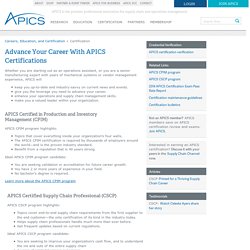
Give you the leverage you need to advance your career. Enhance your operations and supply chain management skills. Make you a valued leader within your organization. APICS Certified in Production and Inventory Management (CPIM) APICS CPIM program highlights: Topics that cover everything inside your organization's four walls. Ideal APICS CPIM program candidate: You are seeking validation or accreditation for future career growth. Learn more about the APICS CPIM program APICS Certified Supply Chain Professional (CSCP) APICS CSCP program highlights: Topics cover end-to-end supply chain requirements from the first supplier to the end customer—the only certification of its kind in the industry today. C-Suite: Bob Stoffel's UPS green dream - Dec. 16, 2010. Interview by Geoff Colvin, senior editor at largeApril 27, 2011: 3:18 PM ET FORTUNE -- Can a company with 100,000 trucks and 550 planes be environmentally friendly?
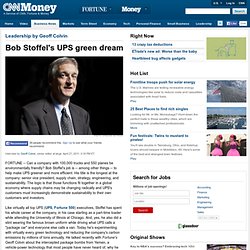
Bob Stoffel's job is -- among other things -- to help make UPS greener and more efficient. His title is the longest at the company: senior vice president, supply chain, strategy, engineering, and sustainability. The logic is that those functions fit together in a global economy where supply chains may be changing radically and UPS's customers must increasingly demonstrate sustainability to their own customers and investors. Like virtually all top UPS (UPS, Fortune 500) executives, Stoffel has spent his whole career at the company, in his case starting as a part-time loader while attending the University of Illinois at Chicago. Q: Terrorists recently used UPS and FedEx to ship bombs addressed to the U.S. from Yemen, and they were detected only after a tip from Saudi intelligence. Right, we don't see a double dip. Yes. Yes.
Supply Chain Academy. Online Discussions. The secret of their Supply Chain. Books. Serious Games. Module 1: What is Supply Chain Management? (ASU-WPC-SCM) Modules supply chain wpcareyschool. Supply Chain, Inventory & Logistics. Logistics Supply Chain KPI. ASU SCMA Site. Supply Chain Top 25. Supply Chain Management. With Oracle SCM, companies can build and operate world class value-chains for profitable growth.
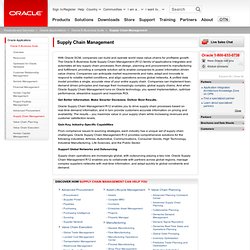
The Oracle E-Business Suite Supply Chain Management (R12) family of applications integrates and automates all key supply chain processes, from design, planning and procurement to manufacturing and fulfillment, providing a complete solution set to enable companies to power information-driven value chains. Companies can anticipate market requirements and risks, adapt and innovate to respond to volatile market conditions, and align operations across global networks.
A unified data model provides a single, accurate view of your entire supply chain. Companies can implement lean, demand driven principles and manage their increasingly complex, global supply chains. SAP Supply Chain Management: Planning, Execution, and Collaboration across The Responsive Supply Network. SCM Focus — Comprehensive Explanations of Supply Chain Software Topics. Business excellence. Business excellence is the systematic use of quality management principles and tools in business management, with the goal of improving performance based on the principles of customer focus, stakeholder value, and process management.
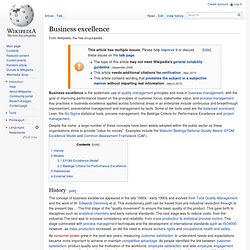
Key practices in business excellence applied across functional areas in an enterprise include continuous and breakthrough improvement, preventative management and management by facts. Some of the tools used are the balanced scorecard, Lean, the Six Sigma statistical tools, process management, the Baldrige Criteria for Performance Excellence and project management. Despite the name, a large number of these concepts have been widely adopted within the public sector as these organisations strive to provide "value for money". Examples include the Malcolm Baldrige National Quality Award, EFQM Excellence Model and Common Assessment Framework (CAF).
History[edit] Models[edit] EFQM Excellence Model[edit] Baldrige Criteria for Performance Excellence[edit] Strategic Supply Chain Management. Introduction Supply chain management operates at three levels; strategic, tactical and operational.
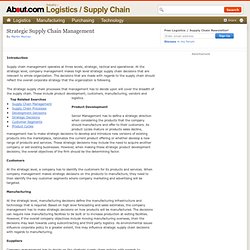
At the strategic level, company management makes high level strategic supply chain decisions that are relevant to whole organization. The decisions that are made with regards to the supply chain should reflect the overall corporate strategy that the organization is following. Tactical Supply Chain Management. Introduction.
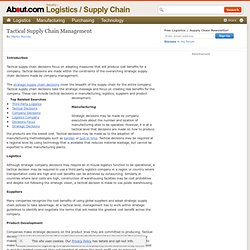
Operational Supply Chain Management. Introduction Operational supply chain decisions are made hundreds of times each day in a company.
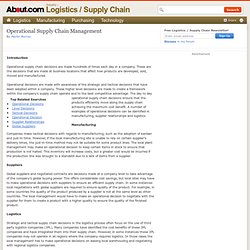
These are the decisions that are made at business locations that affect how products are developed, sold, moved and manufactured. Operational decisions are made with awareness of the strategic and tactical decisions that have been adopted within a company. These higher level decisions are made to create a framework within the company’s supply chain operate and to the best competitive advantage.
The day to day operational supply chain decisions ensure that the products efficiently move along the supply chain achieving the maximum cost benefit. Manufacturing Companies make tactical decisions with regards to manufacturing, such as the adoption of kanban and just-in-time. Suppliers Global suppliers and negotiated contracts are decisions made at a company level to take advantage of the company’s global buying power.